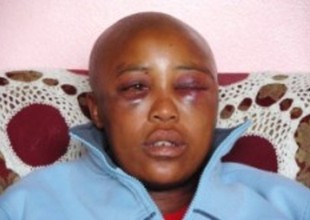
ALTERNET– The photograph is not easy to look at, and it’s not clear at first glance if Millicent Gaika, the woman in the photo, is dead or alive. Huge purple bruises surround both of her swollen eyes, and her neck is crisscrossed by a number of open gashes and scars. By now the bruises have subsided, some of the scars have healed, and in court testimony in November Millicent was able to tell a judge about how the man who raped her said, “I know you are a lesbian. You are not a man, you think you are, but I am going to show you, you are a woman.” That man, Andile Ngoza, is now out on the streets, despite being released and re-arrested after the attack on Millicent. His bail this time, for violating the terms of his parole, was set at 60 Rand, or just under $10 USD.
“To use a very South African term, I was just so hurtful,” Billi du Preez, a volunteer activist with Luleki Sizwe, tells me. Luleki Sizwe, a small, all-volunteer group that campaigns for LGBT people, is based in Capetown’s mostly poor black townships and rural areas. The organization works with and supports women who have been victims of what has fast become a ubiquitous form of targeted sexual violence in South Africa: “corrective rape” against gay women or women suspected of being gay, as a form of “curing” them. The most disturbing thing about the attack on Millicent is not how rare it is in South Africa—but how common. The organization itself is named after two women who were killed from “corrective rape”-related health complications. One of those women was the fiancé of the organization’s founder, Ndumie Funda.
“These crimes have been going on for years already, and we haven’t been getting anywhere,” says Billi. “Millicent’s case has been put off and put off. When the perpetrator, who’s running free, started threatening Millicent again, I decided enough is enough.”
After years of rallying, marching, and local organizing by members of Luleki Sizwe, what Billi did next was take a shot in the dark. She drafted text to accompany the photo of Millicent’s battered face, and a few weeks ago sent it in as a petition to Change.org, a popular social action platform, demanding that the South African Ministry of Justice declare “corrective rape” a hate crime. What happened next took her, and many others, by surprise. Within a matter of weeks, the petition has garnered over 130,000 signatures from almost every country in the world and is growing quickly, making it the site’s most popular petition to date.
Continue reading about the Campaign to Stop Rape Used to ‘Cure’ South African Women of Homosexuality.
Photo by Luleki Sizwe
© COPYRIGHT ALTERNET, 2011










